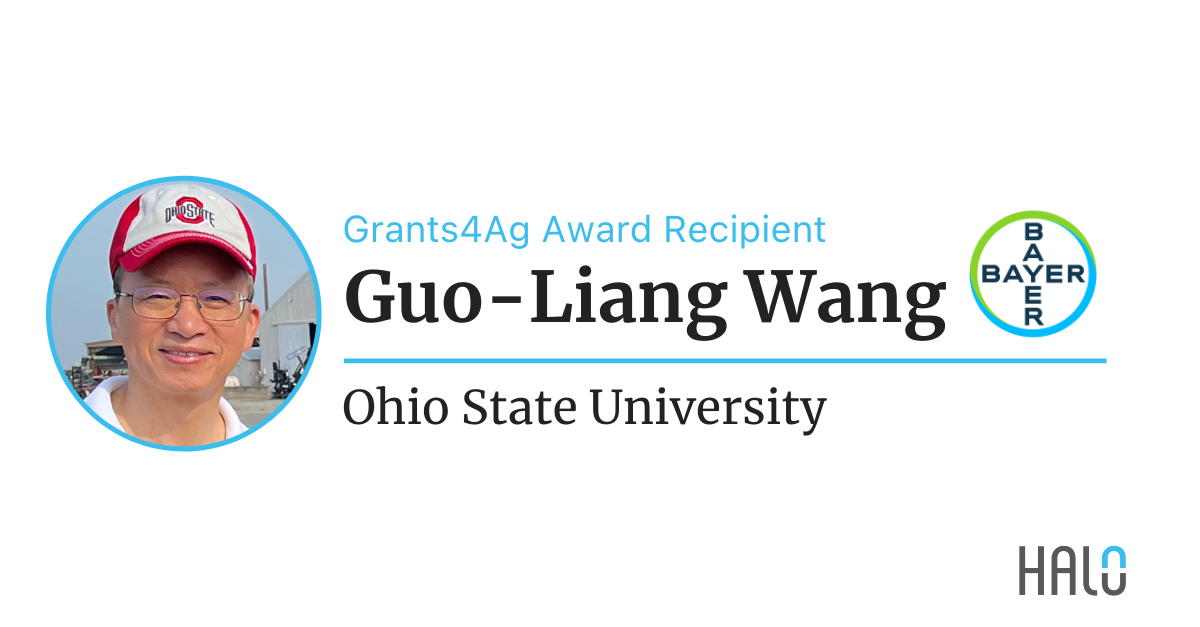Sustainable crop protection is a growing concern due to the damage that occurred from excessively using certain types of pesticides and fertilizers. By utilizing cell-penetrating proteins, Dr. Guo-Liang Wang is researching novel ways to improve biological defense against harmful pathogens. View Halo Profile >>
About Guo-Liang Wang
Guo-Liang Wang is a Professor of Plant Pathology at Ohio State University. Wang is from Columbus, Ohio and completed his PhD at The University of the Philippines at Los Banos. He is involved with the American Phytopathology Society.
Tell us about your research.
The focus of our laboratory is to understand the mechanisms of plant-pathogen interactions, and the signal transduction pathways leading to the induction of disease resistance responses. We are cloning and characterizing disease resistance genes and genes involved in resistance responses to fungal and bacterial pathogens. In addition, we are using novel cell penetrating peptides (CPPs) to efficiently deliver defense activator proteins into plants for disease management. Our long-term goal is to develop new control approaches for plant diseases in such a way as to reduce reliance on the environmentally damaging pesticides.
To feed the growing world population, the agricultural sector needs to increase food production even while being attentive to the impact of new strategies on ecosystems and human health.
Can you explain that to a non-scientist?
To feed the growing world population, the agricultural sector needs to increase food production even while being attentive to the impact of new strategies on ecosystems and human health. Excess use of pesticides and fertilizers has endangered our ecosystems and human health in the past decades. A promising environment-friendly innovation is the use of biological defense activators, biostimulants and biopesticides in sustainable farming. However, these peptides/proteins have poor penetration efficiency in foliar applications and seed treatments. We engineered a novel cell-penetrating protein and demonstrated that it can effectively deliver a defense activator protein into plant cells and elicit strong defense activation against pathogens.
Why did you choose this area of research?
As an undergraduate at Hunan Agricultural University in China, I started to develop my life-long interest in plant disease resistance because I knew rice diseases cause huge yield losses in my hometown. I continued the same line of research in my MS and PhD studies and in my own laboratory at the Ohio State University (OSU) in 1999. In the last 23 years, my team has identified a dozen of immune receptors and signaling proteins that play important roles in plant defense activation. I always think about new strategies to enhance plant immunity using non-GMO approaches. One of the projects is to fuse defense activator and antifungal proteins with the CPP MTD4 and test their applications for plant disease control. If successful, new products can be developed for plant disease control in sustainable agriculture.
New bio-stimulants and defense activators that increase crop production will play a pivotal role in future sustainable agriculture.
What are some of the real-world applications of your work?
Sustainable agriculture will become an essential, innovative farming system that balances sustainability with food/ecosystem security and human health benefits. New bio-stimulants and defense activators that increase crop production will play a pivotal role in future sustainable agriculture. In this project, we will test the efficacy of MTD4-Harpin fusion proteins to control bacterial and fungal diseases of tomato, which is a favorite vegetable globally with over $2 billion production each year in the US alone. Tomato cultivars are susceptible to many pathogens and are heavily sprayed with bactericides/fungicides during production. If the MTD4-Harpin-based CPP technology can protect the tomato plants from infection of different pathogens, our research will have a major impact on tomato production in the US and other countries.


